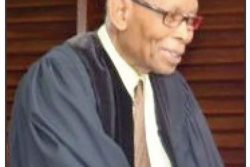Dear Editor,
True to form, Mr Robert Corbin, in his New Year’s address, threw in for sound effect a call for shared governance. He stated “fervently” (according to one media report) that “2009 must mark a decisive shift towards genuine national unity through shared governance.” In all of Corbin’s major speeches as party leader, he has never failed to put the issue of shared governance front and centre. Alas, for him the matter rests there. Mere pronouncements, Mr Corbin apparently believes, are equivalent to, or automatically translate into plans, strategies and actions. This strange logic has been one of the frustrating failures of his leadership. With his New Year’s call for shared governance, could it be that he still expects things to just happen, for pieces to just fall into place?
Recently, letters have appeared again in the press calling for Mr Corbin to step down. In mid-December, the PNCR issued a press statement in which Mr Corbin aggressively defended himself. If you strip away from the statement the attacks on Mr Christopher Ram, you are left with two insights about the PNCR under Corbin. The first is its fire by fire approach to confronting the many problems of the day. The second is its belief in historical fatalism or cyclism (or whatever). Here, the party is trapped in a mindset where it believes history is a cycle, and certain things will happen in the life of a party. Sometimes it is in power, sometimes it is out; it happened to the PPP, now it is happening to the PNCR. That’s how the earth spins. The party’s day will come again as sure as the tides rise. All supporters have to do is keep faith and wait for the future to turn.
On the first insight, it is hard to imagine the PNCR still believes it can make much impact by chasing after the multitude of fires ignited by PPP arrogance and incompetence. The recent PNCR press statement mentions a few of its successes (granted), but these are swamped by the mass of problems at the village, regional and national levels the party has failed to touch. The point has been made enough times within the party that the PNCR cannot limit itself to running after the PPP’s tail, jumping from issue to issue as the PPP pops them up. The party needs to overarch that with an agenda of its own, which must include a fight to change the entire system. Just as important, the party needs to define its line in the sand, a line of no retreat entrenched by the core needs, expectations and dignities of its supporters and the nation. Not a line drawn and shifted for political posturing or gamesmanship. The PPP had its own line when in opposition with its single call for the overthrow of “the PNC dictatorship.” And in government, its bottom line is its conviction that power must be retained at any cost.
Some persons, such as Abu Bakr (in his letter in SN of December 20, 2008, titled ‘What is it that Mr Corbin’s detractors want?’), advocate that the PNCR should humble itself. It should accept the reality that it did not, and cannot, win any election. That due to historical reasons and mistakes of previous leaders, the PNCR has become today the only thing it can possibly be, the only existence it can possible attain. Indeed, Mr Bakr credits Mr Corbin for understanding and accepting this piece of wisdom.
Others, such as those in Team Alexander, feel differently. Over the last several years, the PNCR ought to have done at minimum four things: (i) push for power-sharing not as a ploy but as a system whose time is overdue in Guyana. Mr Corbin would be unable to deny that the party has fleshed out several legitimate strategies to achieve this difficult objective, (ii) implement the ideas and plans to get the party into welfare and community development in a more structured manner. Again, no shortage of plans exist within the party, (iii) rebuild and expand the party’s youth and woman’s arms, and (iv) launch a sustained struggle to resolve the good governance issues that matter most to supporters, such as public procurement and land distribution. It is not that one always expects the party to achieve overnight or stunning success on all these and other fronts. But what one expects is the party to be pushing hard and seriously in certain clear directions.
The quarrel with Robert Corbin is that he has shown no persistent desire to embrace or do any of these things. In fact, in the case of the party’s youth arm, he has done the opposite − he has been destructive. And when one therefore assumes he has an alternative strategy for the party, little issues forth. Maybe, we should be patient and wait for the cycle of history to turn in the PNCR’s favour.
Yours faithfully,
Sherwood Lowe









